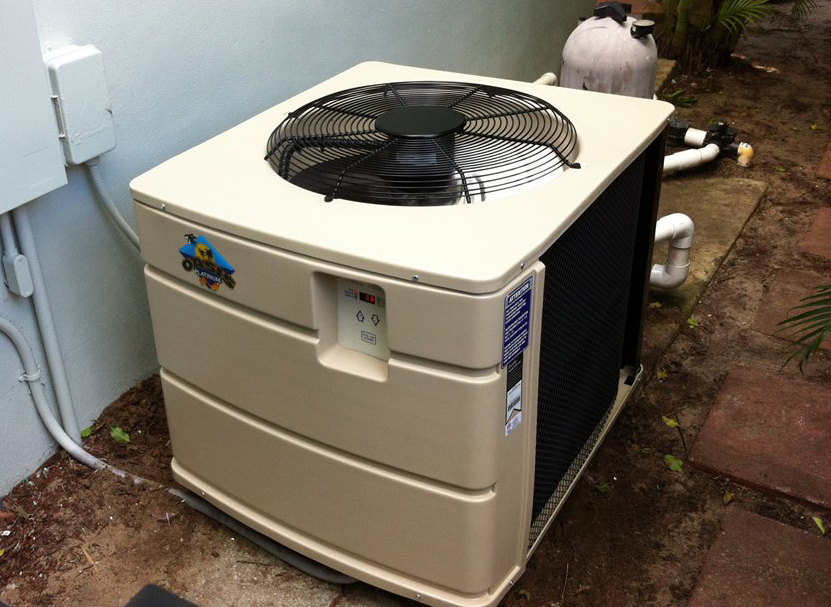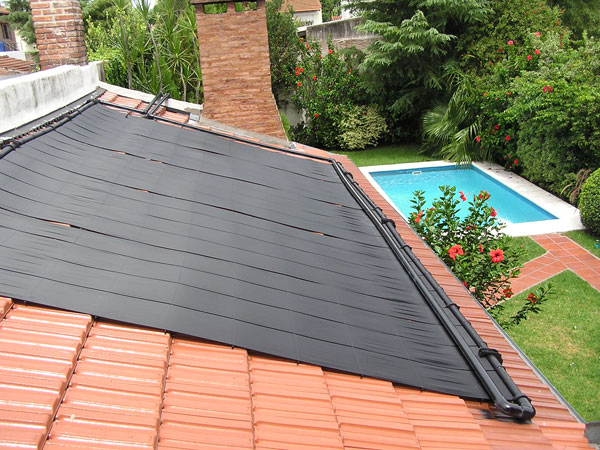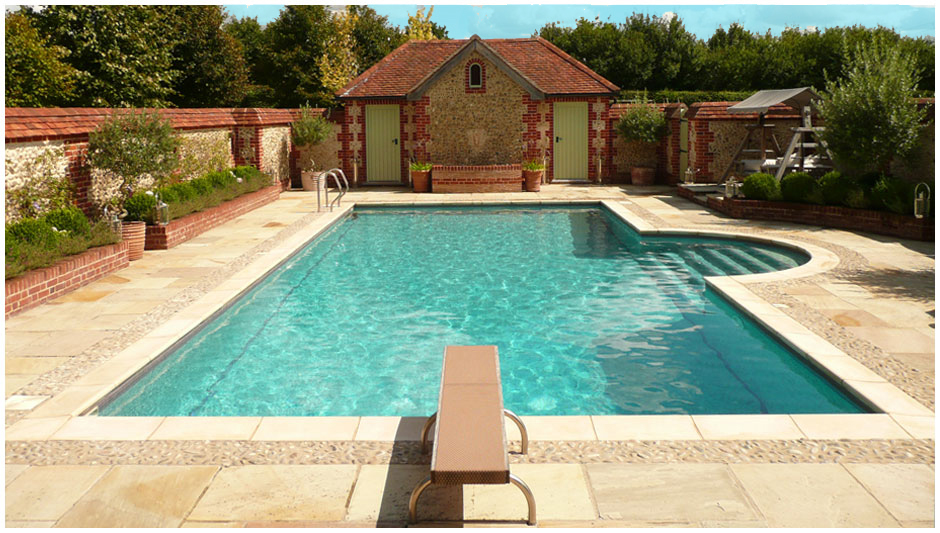Whether you’re a new pool owner or a veteran, you’ve likely heard plenty of myths about pool heaters over time. Claims that sound completely true, but never quite add up. Well, we’re here to clear the air of all that misinformation floating around.
20 Myths About Pool Heaters: BUSTED



Above ground pool heaters will skyrocket your electric bill
This is entirely dependent on what type of pool heater you own. Pool heat pumps (seen above) can run for as little as $50 a month. And solar pool heaters source their heat naturally.
But gas and electric resistance pool heaters? We’ll get to those soon.
Bigger pool heaters are better
Although a bigger pool heater usually means more BTU (power), it doesn’t necessarily mean better. A small pool heat pump can heat your pool just as effectively as a large one, and at half the cost. Because it’s really the size of your pool that determines which pool heater size is best. Which we discuss further in our guide to buying a pool heater.
Don’t need a pool heater. I can swim in unheated water
While some may consider this one of the most common myths about pool heaters, others may just call it preference.
Regardless, we certainly can’t tell you it’s not possible. On a perfect, hot summer day, your pool may naturally warm up on its own. Now it won’t be an ideal, perfect temperature, but swimmable nonetheless.
But the thing is, you may not have that picture-perfect weather every time you want to swim. Especially if you don’t live in a particularly sunny state. Meaning that the comfort of your swim (water temperature) is entirely dependent on forces beyond your control. But owning a pool heater gives you that control back, and more.
Pool heater won’t turn on. Needs to be replaced
A pool heater failing to turn on can be caused by a number of factors. From something as simple as corroded wiring to a burnt out motor. It’s usually tough to tell unless you’re a trained pool heating specialist.
Hence, why we recommend a pool heater troubleshooting service when dealing with heating problems. The fix can be simpler than you think, and often much cheaper than replacing the heater.



Pool heaters aren’t eco-friendly
There’s a solid degree of truth to this statement, that is if you’re talking about gas heaters. Since their primary means of generating heat is combustion or the burning of gas, they naturally produce a hefty amount of C02 emissions.
But if you’re talking pool heat pumps, solar heaters, or electric resistance, then there are virtually ZERO emissions involved.
Pool heaters aren’t energy efficient
Here’s another myth about pool heaters that’s both true and false. On one end, gas pool heaters and electric resistance heaters consume a hefty amount of resources (electricity/gas) compared to how much heat they produce.
Whereas, pool heat pumps and solar heaters are the opposite. Producing a gracious amount of heat with a light pull on resources.
Pool heaters can run fine without any maintenance
It’s possible to run your pool heater for a few years without any issues — never once putting a dime towards maintenance or repair.
But there’s a major downside to doing that.
Poor maintenance easily cuts a pool heater’s lifespan in half, causing it to work harder than it’s designed to while putting a heavier strain on all the parts and components. This opens doors to unexpected, expensive repairs down the road. And in worse cases, complete unit failure.
On the flip side, a pool heater that’s well-maintained and serviced annually can last even longer than expected. Because in pool heating, good maintenance is the best preventative measure against the unexpected. And a trained pool heating technician can handle all of it for you. From catching small issues before they develop into major problems, to ensuring that everything works exactly how it should.
So by simply treating your pool heater well, you can extend its lifespan and save hundreds in repair costs down the road — a useful tip you probably weren’t expecting to find while uncovering myths about pool heaters.
Generic parts are fine for pool heater repair
The generic pool heater parts game is a dangerous one because nearly all pool heaters are built according to extremely precise specifications. Specifications so precise that even a slight change can completely alter performance.
For instance, the blades on pool heat pump fans are created with a specific angle. An angle carefully calculated to work optimally with all of the other heater parts. Since this angle is different for every heater, using a replacement fan that’s even slightly different can do more harm than good. A quick fix that strains the unit and forces it to operate under conditions it wasn’t designed for.
This same concept carries over to nearly every part of a pool heat pump (and most pool heaters in general).
Pool heat pumps are more expensive than gas
If a pool heat pump and gas heater were used to heat the same backyard pool , the pool heat pump would be more affordable every single time.
By a huge margin.
Mostly because heat pumps are specifically designed with efficiency at the forefront — offering reliable cost-effective heating at a moderate speed. Whereas gas heaters, well they focus entirely on speed. But fast heating for an average sized swimming pool means a whole lot of gas burning. Hence, why gas heaters are usually best for small spas.
[Want to know a bit more? Check out our post, Pool Heat Pumps versus Gas Heaters]



Pool heat pumps have a short lifespan
Not at all. The average lifespan for a pool heat pump ranges from 10-20 years. And as you know from earlier, that range can easily be extended or decreased based on how well you maintain your unit.
Pool heat pumps are too noisy
A well-maintained pool heat pump will produce just enough noise to let you know it’s up and running. Never enough to be a nuisance. But if you’re hearing loud clanking or grumbling, something probably needs fixing.
[Pool heater problems you can’t figure out? Our pool heater troubleshooting is the solution]
Pool heat pumps don’t work without sunlight
Pool heat pumps will definitely work a bit better on the brighter and sunnier days of the year. But unlike solar heater, they’re by no means dependent on sunlight. Even on cloudy days, a pool heat pump can easily heat your pool to a comfortable temperature as long as it doesn’t get too cold outside. This is because pool heat pumps harvest heat from the air as opposed to solar rays.
Explaining how pool heat pumps works goes bit beyond the scope of a post concerning myths about pool heaters. Luckily, you can read all about it in this post.
Solar pool heaters are the cheapest
When it comes to monthly operation costs, solar pool heaters will almost always be the cheapest to operate. And rightfully so, since they source their heat naturally from the sunlight.
But here’s the kicker.
Solar pool heaters aren’t easy to set up. They require numerous panels to be installed (by a professional) and often call for a strong pool pump. Which for many pool owners, means having to upgrade to a stronger and more powerful pump. All which contributes to a hefty installation cost.



Solar pool heaters are the best heating option
Depending on where you live, a solar pool heater could be the best option for you. In states that get a lot of sunshine year round, solar pool heaters thrive. And they’re cost effective.
But if you want to swim unrestricted, regardless of weather, solar pool heaters fall short. Hence, why many solar pool heater users turn to the dream team combination. — using solar pool heaters and pool heat pumps together for a great balance between reliability and cost-effectiveness.
Solar pool heaters work on cloudy days
Overall, solar pool heaters require direct sunlight to work effectively. On a cloudy day, you may get some heat from the spurts of sunlight that peek out of the clouds here and there. But likely nowhere near enough needed to adequately heat the pool throughout the day.
So yes, they CAN potentially work on some cloudy days. But would you consider less than half efficiency and inconsistent temperatures “working”?
Gas pool heaters are inexpensive to run
Here’re another one of those interesting myths about pool heaters.
Under the right conditions, gas pool heaters can be affordable to run. But these conditions are specifically limited to small spas that aren’t used on a regular basis. Heating them a few times throughout the month can be affordable. But it’s likely you’ll want to use your spa more often. And as you know , the only thing that burns faster than gas is the money you spend on it.
Gas pool heaters are easy to install
Although their design is simple, since gas pool heaters require a dedicated gas line, their installation is not. A dedicated line directly connected to a natural gas pipeline or nearby propane tank (which may need to be purchased separately). One that requires professional help and a good amount of time to set up.
Electric pool heaters are good for any size pool
Much like they’re gas-powered cousins, electric pool heaters (electric resistance) are best for small spas. They heat quickly but pull heavier on electricity than any other pool heating option.
[Want to know a bit more about electric pool heaters? Check out this post]
Electric pool heaters are cheaper than gas
Despite the fact that the cost of electricity is cheaper than gas, electric resistance heaters still consume a lot of energy. So much that in most cases, using a gas heater is the cheaper option of the two.



Closing remarks
As always, we hope you found this post helpful. The information mentioned should give you a clearer understanding of the facts of pool heating. And if you’re a new pool owner looking to buy a pool heater, hopefully uncovering these myths about pool heaters makes your decision easier.
How many of these myths about pool heaters did you previously believe were facts?
Did any in particular surprise you?
Let us know in the comments below.


